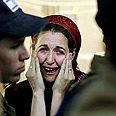
Arabs slam pullout coverage
The images of crying soldiers escorting crying families out of their Gaza Strip homes broadcast by Arabic-language television networks impace Arab street; suddenly, settlers have become human, but not everyone in the Arab world is happy about the change
Something strange happened last week,"wrote Daoud Kuttab, the director of the Institute of Modern Media at al-Quds University in the New York Times earlier this week.
"Israeli settlers and Jewish extremists appeared human on Arab TV. This is not to say that Arabs have suddenly become soft on their historical enemies. But hours and hours of watching - on all stations, including Al Jazeera - close-ups of mothers and babies, of young women and older men, visibly in anguish as they were forced out of their homes, had an emotional effect."
It would appear that even before the first stage of the disengagement, the images broadcast live to homes around the Arab world have had an effect.
The images, including the bitter tears of soldiers and evacuees alike, passive resistance together with hugs and Israeli flags – and all without real violence – have managed to affect Arab viewers in different ways.
Part of this is due to the openness of the IDF Spokespersno's Office, praised by many senior Arab journalists, and also by the fact that all the large networks sent armies of reporters to affected areas.
For example, al-Jazeera used six reporters to cover the pullout, and competing al-Arabiyya sent seven, in addition to special broadcasts from open studios.
Israeli trap
But not everyone in the Arab world was pleased by the coverage, and varying groups accused the Arabic-language media of "serving the interests of (Prime Minister Ariel) Sharon."
For instance, Abd Al-Bari Atwan, editor-in-chief of the London-based al-Quds al-Arabi, harshly criticized the coverage, saying, "we understand the international media falls into the traps set by the settlers, and they voiced their opposition to the move by showing these live images. But we can't understand how the Arab media fell into the same trap."
Speaking to the Agence France Presse, Atwan added, "Worldwide opinion fell into the trap of settlers crying for their stolen houses. Israel's withdrawal from Gaza, and the fact that Sharon used this to his advantage, is all an inflated media circus."
There is apparently only one way to understand Atwan's opinion, shared by many in the Arab world: The hugs and tears of both settlers and soldiers indeed had an effect.
As Kuttab wrote, "Whether Palestinians and Arabs will admit it or not, the powerful images of the last few days can't be ignored. Irrespective of the facts that Jewish settlements are illegal and that the Palestinian refugee problem was created by Israeli military force, the human cost on both sides of the conflict is huge. While not agreeing with either the settlers or the actions of Palestinian militants, the rest of us must start understanding and respecting them as humans. And it would help if the international news media began portraying ordinary Palestinians, too, with a touch of humanity."
"The dramatic scenes from Gaza should lead us all to double our efforts to ensure that Palestinians can be free in an independent state, alongside a safe and secure Israel," he concludes.
"Light unto the nations"
And then there is another angle: Millions of Arab viewers have now viewed soldiers and civilians engaged in clashes, but not of the kind customary throughout the Arab world.
"More than one journalist covering the pullout told me, 'would it be that our (Arab) armies and police forces treated civilians like that,'" said Eitan Aroussi, head of the Arabic desk at the IDF spokesman's office.
The Gaza pullout created a phenomenon of "light unto the nations," through which the Arab world has seen soldiers and police carry out political decisions with determination, but without violence of any kind.
"In this, they have seen democracy in action. This, too, will have an affect," Aroussi said.










